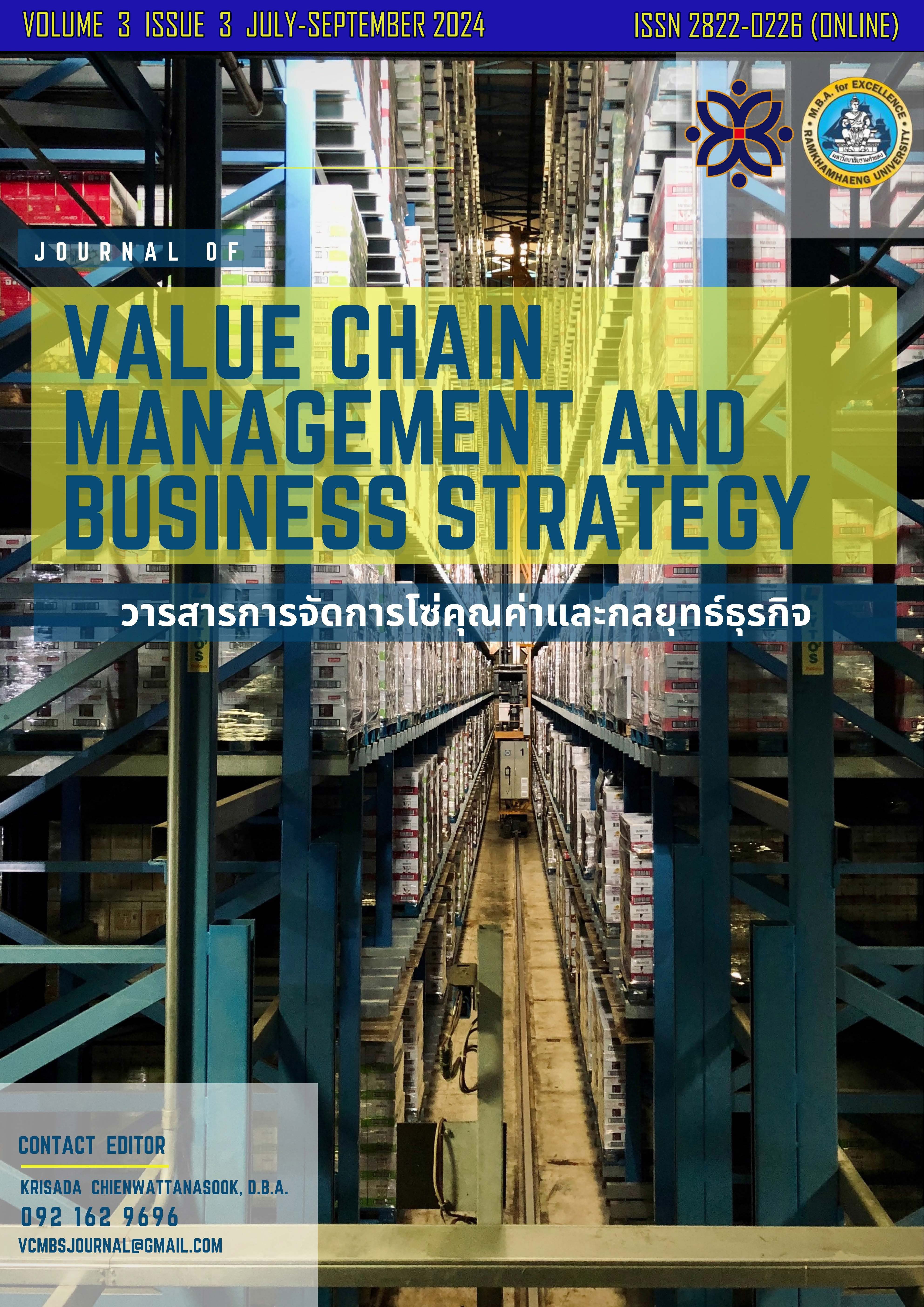ผลสัมฤทธิ์ทางการเรียนรู้เรื่องการขนส่งต่อเนื่องหลายรูปแบบด้วยการจัดการเรียนรู้แบบสถานการณ์จำลอง: กรณีศึกษานักศึกษาสาขาการจัดการโลจิสติกส์และซัพพลายเซน
คำสำคัญ:
ผลสัมฤทธิ์ทางการเรียน, การขนส่งต่อเนื่องหลายรูปแบบ , การจัดการเรียนรู้แบบสถานการณ์จำลองบทคัดย่อ
การวิจัยนี้มีวัตถุประสงค์เพื่อศึกษาผลสัมฤทธิ์ทางการเรียนเรื่องการขนส่งต่อเนื่องหลายรูปแบบด้วยการจัดการเรียนรู้แบบสถานการณ์จำลองของนักศึกษาสาขาการจัดการโลจิสติกส์และซัพพลายเซน และเพื่อเปรียบเทียบผลสัมฤทธิ์ทางการเรียนเรื่องการขนส่งต่อเนื่องหลายรูปแบบของนักศึกษาสาขาการจัดการโลจิสติกส์และซัพพลายเซน ระหว่างก่อนและหลังจากการจัดการเรียนรู้แบบสถานการณ์จำลอง กลุ่มตัวอย่างที่ใช้ในการวิจัยคือ นักศึกษาสาขาการจัดการโลจิสติกส์และซัพพลายเซน ชั้นปีที่ 3 มหาวิทยาลัยเกริก จังหวัดกรุงเทพฯ ที่กำลังศึกษาในภาคเรียนที่ 2 ปีการศึกษา 2566 จำนวน 1 ห้อง มีนักศึกษาจำนวน 40 คน เครื่องมือที่ใช้ในการ ประกอบไปด้วย แผนการจัดการเรียนรู้แบบสถานการณ์จำลอง และแบบทดสอบวัดผลสัมฤทธิ์การเรียน เพื่อนำมาวิเคราะห์ข้อมูลด้วย ค่าค่าเฉลี่ย ร้อยละ ค่าเฉลี่ย และส่วนเบี่ยงเบนมาตรฐาน และทดสอบสมมติฐานด้วย Paired t-test
ผลการวิจัยพบว่า ผลสัมฤทธิ์ทางการเรียนเรียนเรื่องการขนส่งต่อเนื่องหลายรูปแบบด้วยการจัดการเรียนรู้แบบสถานการณ์จำลองของนักศึกษาสาขาการจัดการโลจิสติกส์และซัพพลายเซน โดยรวมอยู่ในระดับดีเยี่ยม (= 34.62) และมีนักศึกษาร้อยละ 80 อยู่ในระดับดีเยี่ยมและอยู่ในระดับดีร้อยละ 20 ซึ่งเป็นไป และผลการทดสอบสมมติฐานพบว่า ผลสัมฤทธิ์ทางการเรียนเรื่องการขนส่งต่อเนื่องหลายรูปแบบของนักศึกษาสาขา การจัดการโลจิสติกส์และซัพพลายเซน หลังจากการจัดการเรียนรู้แบบสถานการณ์จำลอง สูงกว่าก่อนการจัดการเรียนรู้แบบสถานการณ์จำลองอย่างมี นัยสำคัญทางสถิติที่ .05
เอกสารอ้างอิง
Bellotti, F., Kapralos, B., Lee, K., Moreno-Ger, P., & Berta, R. (2013). Assessment in and of serious games: An overview. Advances in Human-Computer Interaction, 2013, 1-11.
Bradley, P. (2006). The history of simulation in medical education and possible future directions. Medical Education, 40(3), 254-262.
Clapper, T. C. (2015). The case of experiential learning in action. Simulation & Gaming, 46(2), 148-150.
Crainic, T. G., & Kim, K. H. (2007). Intermodal transportation. In C. Barnhart & G. Laporte (Eds.), Handbooks in operations research and management science, 14, 467-537.
Dekker, R., Bloemhof, J., & Mallidis, I. (2012). Operations Research for green logistics–An overview of aspects, issues, contributions and challenges. European Journal of Operational Research, 219(3), 671-679.
Dewey, J. (1938). Experience and Education. Macmillan.
Dieckmann, P. (Ed.). (2009). Simulation settings for learning in acute medical care. LIT Verlag Münster.
Fanning, R. M., & Gaba, D. M. (2007). The role of debriefing in simulation-based learning. Simulation in Healthcare, 2(2), 115-125.
Gaba, D. M. (2007). The future vision of simulation in healthcare. Simulation in Healthcare, 2(2), 126-135.
García-Díaz, J. C., González-Sánchez, R., & González, J. C. (2021). Improving logistics management through simulation-based learning. Journal of Educational Technology & Society, 24(1), 35-47.
Garris, R., Ahlers, R., & Driskell, J. E. (2021). Games, motivation, and learning: A research and practice model. Simulation & Gaming, 33(4), 441-467.
Hickford, C. (2019). Enhancing logistics education with simulation-based methods. Logistics Education Journal, 12(2), 101-116.
Kolb, D. A. (1984). Experiential learning: Experience as the source of learning and development. Prentice-Hall.
Lateef, F. (2020). Simulation-based learning: Just like the real thing. Journal of Emergencies, Trauma, and Shock, 13(2), 155-159.
Lemoine, W., & Skjoett-Larsen, T. (2004). Reconfiguring logistics systems to global markets. International Journal of Physical Distribution & Logistics Management, 34(9), 690-704.
Mentzer, J. T., DeWitt, W., Keebler, J. S., Min, S., Nix, N. W., Smith, C. D., & Zacharia, Z. G. (2001). Defining supply chain management. Journal of Business logistics, 22(2), 1-25.
Munir, F., Anwar, S., & Kee, D. M. H. (2018). Impact of simulation-based learning on learning outcomes in logistics education. Journal of Education and Learning, 7(5), 12-25.
Nestel, D., & Tierney, T. (2007). Role-play for medical students learning about communication: Guidelines for maximising benefits. BMC Medical Education, 7(1), 3.
Rangel, C. (2021). Technological advancements in multimodal transportation management. Global Transport Journal, 29(3), 175-190.
Rodrigue, J. P., Comtois, C., & Slack, B. (2017). The geography of transport systems (4th ed.). Routledge.
Rosen, M. A., Salas, E., Silvestri, S., Wu, T. S., & Lazzara, E. H. (2008). The history and future of simulation-based training in anesthesia. Anesthesia and Analgesia, 106(6), 1937-1945.
Ruiz-Gallardo, J. R., Castano, S., Gomez-Alday, J. J., & Valdes, A. (2013). Assessing student workload in problem-based learning: Relationships among teaching methodology, student workload, and achievement. Teaching and Teacher Education, 30, 52-62.
Salas, E., DiazGranados, D., Klein, C., Burke, C. S., Stagl, K. C., Goodwin, G. F., & Halpin, S. M. (2009). Does team training improve team performance? A meta-analysis. Human Factors, 50(6), 903-933.
Schlegel, C., Woermann, U., Shaha, M., & Rethans, J. J. (2016). The impact of simulation-based learning in education: A meta-analysis. Simulation in Healthcare, 11(1), 57-64.
Stewart, G., & Chase, R. (2019). Simulation in logistics education: A case study. International Journal of Logistics Research and Applications, 22(4), 245-260.
Zong, T. (2020). Multimodal transportation and its role in global trade. International Journal of Transport Economics, 47(3), 211-228.
ดาวน์โหลด
เผยแพร่แล้ว
รูปแบบการอ้างอิง
ฉบับ
ประเภทบทความ
สัญญาอนุญาต
ลิขสิทธิ์ (c) 2024 วารสารการจัดการโซ่คุณค่าและกลยุทธ์ธุรกิจ

อนุญาตภายใต้เงื่อนไข Creative Commons Attribution-NonCommercial-NoDerivatives 4.0 International License.




